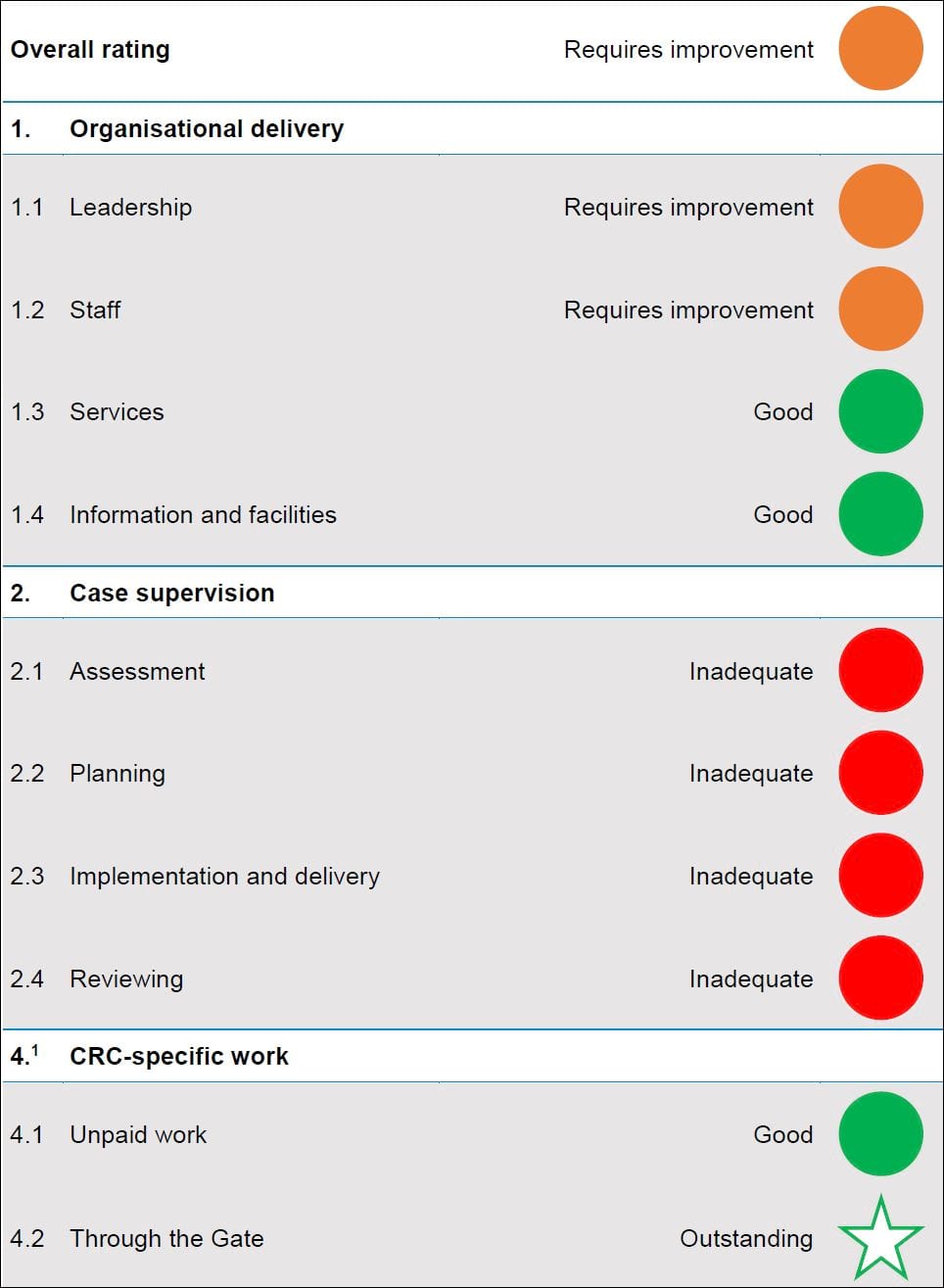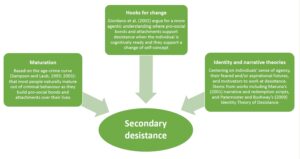Public Protection work must improve
For the second time this week, a report by probation inspectors highlights the failures in public protection work in Community Rehabilitation Companies. Today’s report focuses on the Staffordshire and West Midlands CRC.
Like the inspection report of the neighbouring Derbyshire, Leicestershire, Nottinghamshire and Rutland Community Rehabilitation Company (DLNR CRC) published earlier this week, a CRC run by the same company – the Reducing Reoffending Partnership, the organisation was ranked as inadequate on all four core domains relating to case supervision.
HM Inspectorate of Probation inspected Staffordshire and West Midlands Community Rehabilitation Company (CRC) last autumn. Inspectors looked at 10 aspects of the CRC’s work and gave an overall ‘Requires improvement’ rating.
The CRC supervises more than 12,600 low and medium-risk offenders. These individuals are preparing to leave or have left prison, or are serving community sentences.
Chief Inspector of Probation Justin Russell said:
“We returned to Staffordshire and West Midlands CRC almost a year after our previous inspection. There have been some signs of progress but the overall rating stays the same, which is disappointing.”
Inspectors found there had been a “deterioration” in the quality of case management since the last inspection.
Mr Russell said:
“Probation services need to strike the right balance between rehabilitation and public protection. We inspected a sample of cases and looked at how staff assess, plan, deliver and review activity with individuals under probation supervision. Serious concerns remain about the quality of this work. The management of risk of harm was not good enough at every stage of supervision. Therefore, we have rated all four aspects that we inspect ‘Inadequate’ – our lowest possible grade.”
Inspectors found staff were “demoralised” and high levels of sickness absence was the norm.
At the time of the inspection, probation staff managed an average of 64 cases each. Almost 70 per cent of interviewed staff said their workloads were unmanageable.
Inspectors did note the CRC has some strengths.
The strongest area of performance is the Through the Gate service, which supports people as they prepare to leave prison and resettle in the community. Inspectors noted “a marked improvement” in the service compared to the previous visit and rated this work ‘Outstanding’. The CRC has received additional funding from central government for this scheme. The Through the Gate service now has “good leadership, good staff supervision, and well-trained and motivated staff”.
Inspectors found the quality of work to help individuals under probation supervision access education, training and employment was also delivered to a high standard.
The CRC has helped more than 3,000 people to secure jobs since 2016. Inspectors praised the CRC’s “forward-looking and successful” approach to supporting people to get into work.
Inspectors were also impressed by the availability of bespoke services for women across the region. Third-sector organisations deliver these services to help women improve their lives and avoid offending in the future.
Key findings
Inspectors organised their key findings under three main headings: organisational delivery; case supervision and unpaid work & through-the-gate.
Organisational delivery
The senior leadership of the organisation developed clear plans to improve following the previous inspection, but these have yet to achieve the intended impact in the key areas of staff sickness and public protection work. Most administrative processes relating to casework are carried out in the Customer Service Centre in Birmingham, and Reducing Reoffending Partnership leaders have, in the last year, integrated the management of this facility with operational management, rather than as part of the corporate functions. There is a plan to integrate administration even further with local operational management. Importantly, this has the potential to improve the management of information relating to risk of harm as these processes will be handled in the localities in which the service is delivered.
Key strengths of the organisation are as follows:
- There is an experienced and knowledgeable senior leadership team, and they are active and well-respected participants in local strategic multi-agency work.
- The workforce closely reflects the local population, in terms of ethnicity.
- Interventions include a suite of high-quality accredited programmes, well-grounded rehabilitation activity requirement interventions, good access to education, training and employment services, accommodation and support, and substance misuse interventions.
- Individuals supervised by the CRC are treated like citizens accessing any other public service.
The main areas for improvement of the organisation are as follows:
- Public protection work has deteriorated since the last inspection.
- The customer service centre approach to case administration does not adequately support operational staff.
- Line management of responsible officers does not develop the skills necessary for high-quality case management.
- Staff absence due to sickness has remained at high levels since our previous inspection and has had a negative effect on service delivery.
Case supervision
Inspectors were extremely critical about the core probation task of supervising offenders. Fewer than half the SWMCRC cases inspected were of an acceptable standard.
Key strengths of case supervision are as follows:
- The use of a comprehensive assessment tool (the Offender Assessment System – layer 3) for a greater proportion of cases should, over time, improve knowledge of the caseload characteristics and provide a better basis for case supervision.
- A good range of interventions are available that can be used to develop high-quality plans.
- In most aspects of case supervision, the service provided to women is of a sufficient quality.
Areas of case supervision requiring improvement are as follows:
- Work on keeping the public safe is not at an acceptable level, particularly in the Staffordshire cluster.
- Information gathering and analysis of risk of harm-related information is insufficient.
- Levels of sickness absence in the operational staff group are not reducing.
- Management of responsible officers does not consistently focus on the development of skills.
Unpaid work and through-the-gate
- There is a good range of high-quality placements that are of value to the local community in which they operate.
- Supervising staff work in a way that is likely to contribute to a reduction in further offending, supporting individuals in their compliance with the sentence.
- Unpaid work provides appropriately sensitive working opportunities for women.
Areas for improvement of unpaid work are:
- Options to access education, training and employment opportunities while undertaking unpaid work are very limited.
- Responsible officers do not always have a working knowledge of the unpaid work scheme.
- Enforcement action is not always taken promptly.
- Unpaid work supervisors have no access to Reducing Reoffending Partnership email or information technology-based case management systems.
Key strengths of Through the Gate are:
- The project to implement the enhanced Through the Gate service was carefully put together and delivered, with clear and effective communication materials to support the understanding of responsible officers in the community.
- Staff delivering the service have been properly trained and are appropriately supervised.
- There are enough staff and partners to do the job well.
The area for improvement in Through the Gate work was:
- Risk of harm to others needs to be effectively managed in all cases where there are identified concerns.
Conclusion
The Probation Inspectorate works on a four-band rating system: excellent, good, requires improvement and poor. It is very disappointing to see that the performance of SWMCRC has barely improved over the last year, scoring just two points more in my unofficial probation league table and retaining its “requires improvement” rating..









